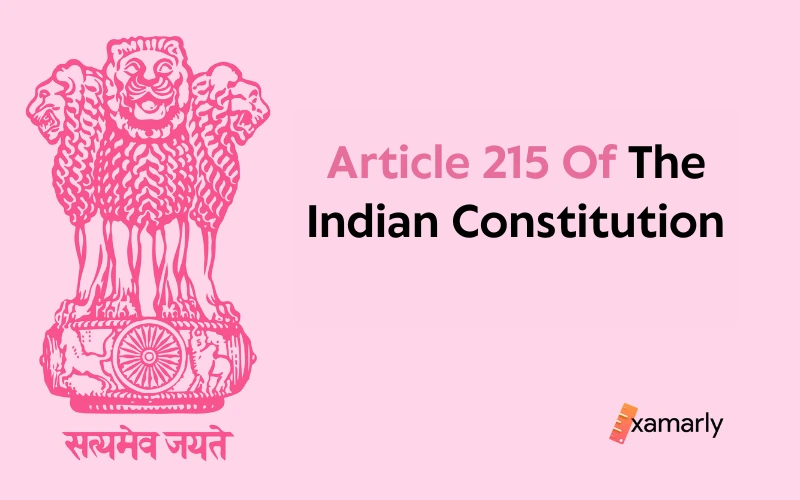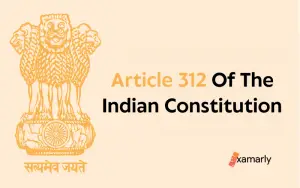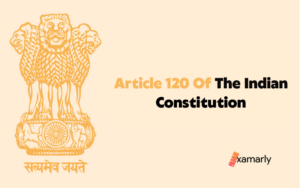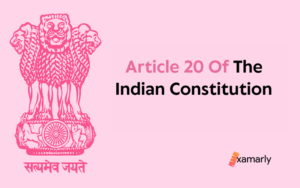According to Article 215 of the Indian Constitution, High Courts must be courts of record.
The highest court in a state is known as the High Court. It is considered to be the country’s second-highest court, right behind the Supreme Court of India. At the present time, there are 25 High Courts dispersed over India.
Article 215 is covered in the UPSC Indian Polity Syllabus and is explained on this page.
What Is Article 215 Of The Indian Constitution?
Constitutional Provisions of Article 215 are as follows:
Every High Court must be a court of record and must have all of the authorities that are associated with such a court, including the authority to penalize contempt of the court.
Note:
- This Article gives power to every high court to punish for contempt of the High Court or subordinate courts.
- HC cannot punish for contempt of the supreme court. That power lies with the Supreme Court.
Contempt Of Court
The capacity of the court to protect its dignity and respect is the power of contempt of court. The 1971 Contempt of Courts Act regulates the authority without limiting it.
The term “contempt of court” refers to behavior that not only willfully disregards or disobeys a court’s orders, but also undermines, impairs, or otherwise adversely affects the rights of witnesses or other parties involved in an ongoing lawsuit.
The Constitution does not provide a definition of “contempt of court.”
However, the Supreme Court is empowered to penalize itself for contempt under Article 129 of the Constitution. The High Courts were granted an equivalent authority under Article 215.
Why needed?
- Upholds the dignity of Courts.
- Courts must be able to defend themselves.
- The courts are challenged by the rise of the post-truth era, radical interests, foreign meddling, etc.
Court Of Record
A court of record is one whose deliberations and actions are recorded for testimony and permanent remembrance. These records are utilized with great authority, and there is no way to doubt their truth. The Supreme Court is designated as the “court of record” by Article 129 of the Indian Constitution. The High Courts of each state are permitted to function as courts of record under Article 215 of the Constitution.
Also, see: Advisory Jurisdiction Of Supreme Court
Conclusion
Lower courts are required to abide by the High Court decisions. All upcoming cases will be related to their methods and judgments. It has the power to punish anyone who disobeys it or one of its lower courts. In addition to this, it has the ability to search the records of its subordinate courts.
In the Interest of Further Reading:
FAQs On Article 215
What Does Article 215 Say?
Every High Court must be a court of record and possess all of the powers that come with being one, including the power to punish contempt of court.
Which Article Is Related To The Court Of Record?
In accordance with the terms of Article 129 of the Constitution, the Supreme Court possesses the authority to impose punishment on itself in the event that it is found to be in contempt of court. Under Article 215, the High Courts were given a similar level of power.
What Is The Purpose Of A Court Of Record?
A trial court or an appellate court is considered to be a court of record if it takes notes of the proceedings and retains them so that they can be reviewed later on in the event of an appeal. A record of any spoken proceedings that take place in court is often taken down by either the court clerk or a court reporter.
What Are The Powers That A High Court Has As A Court Of Record?
The High Court has two authorities as a Court of Record:
1. The High Courts’ decisions, procedures, and acts are all preserved for future reference and witness. When these records are offered to any lower-level court, they are acknowledged to have evidentiary value and cannot be questioned or challenged in any way. They are acknowledged as both legal precedents and references in the legal system.
2. It has the authority to impose a fine, a term of simple prison, or a combination of the two as a penalty for contempt of court.
Who Can Issue Contempt Of Court?
In accordance with Articles 129 and 215, respectively, of the Constitution of India, both the Supreme Court and the High Court have the right to impose punishments on persons for their respective acts of contempt. The High Court’s authority to sanction contempt of the inferior courts is outlined in Section 10 of The Contempt of Courts Act of 1971.
What Is The Meaning Of Contempt?
Although the main purpose of a contempt statute is to punish people who disobey court orders, in India, contempt is also used to punish the one who denigrates the court’s honor and obstructs the administration of justice.
What Court Of Record Means?
A Court of Record is defined as “a court whereof the acts and judicial proceedings are enrolled for a perpetual memorial and testimony, and which has power to fine and imprison for contempt of its authority”.






